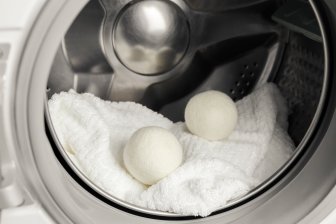Bubbles are on the rise. According to global data company Nielson, sales of carbonated water rose 17 per cent in Canada over 2016 and 2017, which indicates that Canadians are seriously into fizz. But is carbonated water as good for you as regular water?

It can feel like something of a healthy cheat, especially for those who are trying to cut down on their pop consumption but still crave bubbles. But unless you’re making it yourself at home with a carbonation system or buying carbonated water that comes from a natural source, the name brands that are sold alongside bottles of pop at the supermarket can contain sneaky amounts of sugar or sodium.
READ MORE: 6 weight-loss myths that could be holding you back
“There is no evidence that carbonated or sparkling water is bad for us,” says Stephanie Dang, a registered dietitian and co-founder of Vancouver Dietitians. “But you should always read the label to watch out for added sugar and salt. A common mistake people make is thinking that tonic water and soda water are the same.”
In fact, she says, tonic water has 43 grams of sugar and 58 milligrams of sodium per 16-ounce bottle. Considering the average daily intake of sugar should be 37.5 grams for men and 25 grams for women, you could exceed your daily sugar allowance with just one bottle of tonic water.
However, there are some myths about carbonated water that warrant busting.
#1 Carbonated water isn’t as hydrating as regular water
That’s just plain wrong.
“The only difference is the added carbonation,” Dang says.
In a study published in the American Journal of Clinical Nutrition, researchers compared the urine output of test subjects after drinking still water and one of several other commonly consumed beverages, including full fat and skim milk, cola, diet cola, hot tea, iced tea, coffee, lager, orange juice and sparkling water. A difference in total urine masses was only smaller in those who drank milk.
However, the bubbles may be a detriment to those who need to rehydrate after a workout. Because the carbonation may make you feel fuller or cause some gastric rumbling, some may be less inclined to drink it if it’s their only option post-workout. Or at least that’s what one study, published in the International Journal of Sport Nutrition, suggested.
In that case, if you know you’re going for a long run or headed to the gym, make sure you pack some flat water to keep you hydrated. Otherwise, there’s no reason to avoid it.
In fact, scientists at the Research Institute for Child Nutrition in Dortmund, Germany, found that children and teens were more apt to drink carbonated water than anything else, if it was available to them, ultimately making for better-hydrated kids.
READ MORE: ‘Raw’ water is the latest health fad that could make you very sick
#2 Carbonated water erodes tooth enamel
Don’t worry, sparkling water isn’t chipping away at your pearly whites.
According to the American Dental Association, although sparkling water has a slightly higher acid level than plain water, it’s fine for teeth.
“Tooth erosion can result from drinking sweetened carbonated beverages due to their acidity,” Dang says. “However, carbonated water does not have the same effect, and there is no evidence that it erodes tooth enamel.”
There’s one caveat: if you’re prone to add lemon or lime to your carbonated water, you could be upping the acidity levels.
In an interview with Today, Dr. André Ritter, chair of the department of operative dentistry at the University of North Carolina School of Dentistry, said that the best way to offset any concerns about acidity in carbonated water is to drink mineral water, since its high mineral content and things like calcium phosphate can counterbalance any potential damage caused by the low pH of carbonation.
#3 Carbonated water causes osteoporosis
While soft drink consumption may be associated with decreased bone density in women, it has nothing to do with the carbonation.
#4 Carbonated water causes constipation
Believe it or not, some people think the added carbonation could have a gastrointestinal effect, and some researchers believe this is worth investigating.
READ MORE: How much water do you really need to drink in a day?
In a very small study published in Inside Tract, researchers in Italy had test subjects consume carbonated water and tap water over a two-week period and found improved symptoms of dyspepsia (particularly indigestion and feeling full after eating a small amount of food) and less constipation. Those who drank carbonated water also had improved gallbladder function versus those who drank tap water.
Although the precise reason for these improved functions is not known, the researchers speculate it could be because the carbonated water contained more minerals than tap water.
“There is no evidence that carbonated water causes constipation,” Dang says. “However, you are consuming extra air so some people may experience burping and/or bloating and flatulence.”






Comments